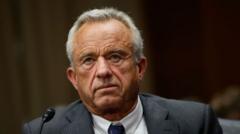In a narrow Senate vote, Kennedy steps into a crucial position managing health agencies amidst scrutiny of his past vaccine skepticism and health claims.
RFK Jr Assumes Role as US Health and Human Services Secretary

RFK Jr Assumes Role as US Health and Human Services Secretary
Robert F. Kennedy Jr. has been officially sworn in as the Secretary of Health and Human Services, stirring debate over his controversial health views.
In a strapline ceremony held at the Oval Office, President Donald Trump formally swore in Robert F. Kennedy Jr. as the new Secretary of Health and Human Services. This confirmation comes amidst rising critique over Kennedy's previous health claims and unfounded vaccine skepticism. The Senate confirmed his appointment with a tight 52-48 vote, which saw no support from Democrats, while former Senate Majority Leader Mitch McConnell was the lone Republican to oppose him.
Kennedy, who previously ran as a presidential candidate, now assumes control of critical health agencies employing around 80,000 individuals with a budget sprawling to nearly a trillion dollars. His objectives will encompass overseeing the Centers for Disease Control and Prevention (CDC), Food and Drug Administration (FDA), and National Institutes of Health (NIH), as well as the Centers for Medicare and Medicaid Services.
Despite the controversy surrounding him, Kennedy gained praise from some Republicans for his oppositional stance on food additives and his critiques against pharmaceutical companies. Notably, he’s recognized as the founder of Children’s Health Defense, an organization noted for casting shadow on the safety and efficacy of vaccines, despite his assertions that he is not anti-vaccine and that all his children are immunized.
During his confirmation hearings, Kennedy faced intense questioning about his stance on abortion, vaccine safety, and health misinformation. With a history of making contentious remarks about vaccines, many lawmakers expressed concern over his capacity to lead pivotal health initiatives. His discussions on abortion revealed a shift towards pro-state control, causing some Democratic lawmakers to lament his supposed compromise on previously held views.
Caroline Kennedy, a cousin to RFK Jr., lobbied against his nomination, stating his views on vaccines disqualify him from leading health policymaking in America. Nevertheless, key Republicans—including those who previously hesitated—eventually supported his nomination. Louisiana Senator Bill Cassidy, a physician, stated his hope that Kennedy could effect meaningful health reforms.
As Trump’s administration continues to finalize remaining cabinet appointments, further nominations, including Howard Lutnick for Secretary of Commerce and Kash Patel for FBI director, are anticipated in the upcoming days. The current political landscape continues to brew tension as several controversial candidates—Kennedy included—navigate the intricacies of health policy under scrutiny.





















